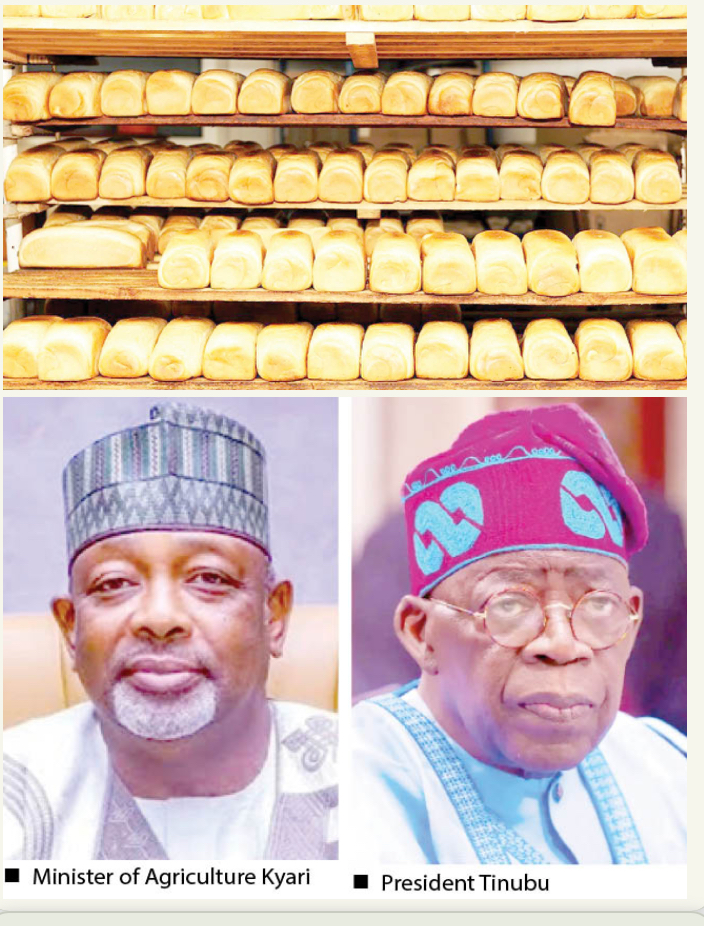
Nigerian Citizens Lamemt as Bread Goes Beyond Reach - DailyTrust
Bread is no longer a staple food in Nigeria as it has been priced beyond our reach, multiple citizens who spoke to Daily Trust across various states of the Federation said yesterday.
According to those interviewed by our correspondents in Gombe, Lagos, Kaduna, Kano, Katsina, and Taraba, millions of Nigerians are now reeling under the rising cost of living exacerbated by inflation.
Some of the respondents said they are now seeking other relatively cheaper alternatives to bread, as the country struggles through rising cost of food and other household iitems.
Bread used to be on the breakfast menu of many families across social strata, but its rising cost has added to the difficulties that many families are going through in recent times.
Labourers at construction sites, drivers at motor parks, students, among others, who hitherto see bread as the cheapest and surest way to start their day no longer afford it.
This is happening at a time when master bakers are equally crying aloud over the high cost of flour, sugar, and energy, with many of them calling for government’s intervention
Kano
A resident of Karkasara quarters in Kano, Muhammad Ali, could not believe it when he was told that a loaf of bread he bought for N900 on Sunday, July 7, was sold to him for N1,100, yesterday.
“I just have to think of an alternative because I can no longer afford bread at this rate. I am eating bread to cut cost but then, it is now beyond what I can afford. A cheaper alternative is a must for me,” he said.
Zainab Musa, a mother of six at Kurnan Asabe neighbourhood also in Kano, said they have turned to Danwake, a local delicacy made from beans flour.
“But the fact is that we no longer do it with beans because it is also expensive. What we now do is to grind sorghum and add plenty potash in it. This is what we give our children for breakfast before they go to school,” she said.
Abdullahi Usman, a school teacher in the same city, said the leftover of what they ate at night is what they warm and eat in the morning.
“The options are extremely few for an average family now. We no longer afford pasta or bread for breakfast. So, we normally manage what is available for breakfast,” he said.
Kaduna
Muhammadu Haruna, a tea and bread seller at Savannah Building, opposite Kaduna Electric’s office has been in the business for a very long time. He admitted that he has never experienced a time like this when the price of bread keeps rising, denying many of his customers their favourite meal.
Haruna said a loaf of bread that he was buying for N250 is now N650, lamenting further that a cup of tea without milk is now N150, instead of N100, previously.
Similarly, tea sellers at Unguwar Sarki attributed the rising cost to the scarcity of bread in the state. They said many bakeries are not producing because the prices of wheat flour and other ingredients have hit the roof top. According to them, it is not profitable to insist on continuing in the business.
Some of them said their customers, rather than tea and bread, eat noodles, which may cost slightly higher than bread but gives some of them satisfaction.
Katsina
In Katsina too, while residents decry the skyrocketing prices of bread, they said many resort to other relatively cheaper foods like spaghetti or Wainar Rogo (fried cassava cake).
A resident, Sada Shuaibu, a civil servant in the state, said he cannot afford bread for breakfast with his family.
“As leader of the family, I have to look for an alternative like Kunu (a drink made from millet or maize) for breakfast. But even that one too is not easy due to the high cost of grains. Last time when it got so tough, I resorted to tuwo but I also discovered that it wasn’t the best way to go because it requires a lot before it is prepared,” he said.
Plateau
Abba Ahmadu Ebeh, a building engineer who works on a construction site in Jos, said most of his workers who used to consume bread can no longer afford it.
He said the labourers often take bread with porridge beans or take it with soft drinks, but now they contribute N500 each to buy raw food and cook at the site, using the security post room or any other conducive place within the premises.
Other times, he said, some of the labourers bring their food from home, especially the left over from the previous day.
Taraba
Labourers in Taraba State said it has been a very long time since they ate bread and beans, their favourite meal while working on site. Some of the labourers interviewed said what they earned daily was not enough to feed their families.
Dauda Maidawa, a bricklayer, told Daily Trust that “You don’t see girls hawking beans and bread as it was in the past because a measure of beans is now N3,000, and the price of bread now starts from N1,000. They are no longer for us. Even the middle income earners are finding it tough,” he said.
He said they now go for ‘Kunun Zaki’ and Soya beans cake.
Gombe
In Gombe, labourers say they have resorted to eating cassava, popularly called ‘Npower,’ at construction sites.
Musa Saidu, said: “Even the young girls hawking rice and beans, popularly called ‘garau-garau’ are no longer selling it. They are now selling cooked cassava, which is affordable for now.”
Bakeries shut down due to rising cost of production
Daily Trust gathered that many bakeries have shut down due to rising cost of production. Findings by our correspondents revealed that the escalating costs of flour, sugar, cooking oil, yeasts and other ingredients, and also energy costs, have forced some bakeries to close shop.
A bad of flour has jumped from N55,000 to N70,000 per 50kg in the last one month, reports by our correspondents confirmed.
Some bakers also cited cost of transportation and strangulating taxation from government as contributing to the bread crisis.
Some bakery owners, who are still operating, however, said they are compelled to make upward review of bread prices due to the surging cost of production. In Lagos, over 70 per cent of bakers have reportedly closed shops over high cost of production while those who remain in business have hiked the price per loaf.
Investogations in Ikeja and other locations indicated that an average price of bread costs between N1,400 and N1,800, depending on the brand picked.
Daily Trust reports that the prices of bread have increased more than three times in the last six months in Lagos, with bakers blaming it on the astronomical cost of baking ingredients.
President of Premium Bakers Association of Nigeria (PBAN), Engr. Emmanuel Onuorah, said: “Price of flour has reached the rooftop; they increased it last week and they want to increase it again. So, instead of closing down, what you do is that you pass on your costs or else you close.
“In Lagos, we have lost over 70 per cent of our members who have shut down their business , but 30 to 40 per cent of us are still standing because if you don’t run your business on the right model, you will close. You are not a charity organisation,” he said.
In Kwara, the Chairman of the Master Bakers, Alhaji Abdulfatai Alaba, urged governments at all levels to act decisively to end the bread crisis in the country.
“The government can no longer allow this to continue,” Alaba stated.
“We are being told that the flour issue has been caused by the scarcity of wheat. Several of our members have shut down operations and when you hike the price due to the situation, the masses will come at you forgetting all the underlying factors.
“A bag of sugar is now N120, 000, a vehicle of wood is being sold for N40, 000 from N3, 000, while a sachet of butter is now N1, 200. How long will this continue? We are just managing to operate,” he said.
The Katsina State Chairman of Bakery Owners’ Association, Abdulkadir Abdullahi, confirmed that about 65 per cent of their members have closed down, while 35 per cent are producing below capacity and only 20 per cent are producing without any profit just to remain in the business.
“I know you must have gone round, where did you see flour in Katsina? The very few that produce bread at the moment are doing so before exhausting their stocks in the next few days, the commodity is no longer available.
“Government must do something now because it seems the scarcity and surging price of commodities might not end anytime soon,” he said.
Chairman of the Plateau State Chapter of Master Bakers and Caterers of Nigeria, Adebayo Taiwo, told Daily Trust that the global scarcity of wheat had impacted the cost of production as flour-millers no longer get sufficient wheat.
“Many of our dealers who do not have the fear of God at heart are taking advantage of the present situation to hoard flour in anticipation that since there is scarcity they can make serious gain if they have the flour in their stores in large quantity. And how do they do it, on day one for instance, they will sell at normal price; on day two they will increase it, and then keep increasing it. That is how they have been doing it.